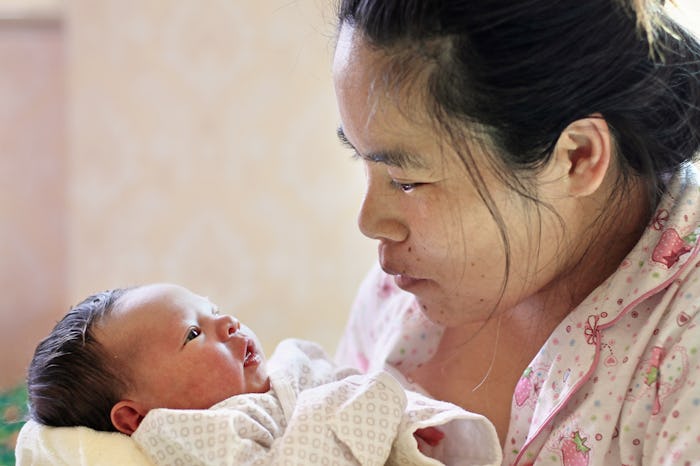You probably already know about all of the ups and downs that occur during the three trimesters of pregnancy. During each trimester, your body changes, you might feel permanently attached to your toilet at points due to morning sickness or an almost-born baby laying on your bladder, and you will definitely experience a rollercoaster of emotions. You may think that the rollercoaster ride is over once you give brith, but mama, you may be in for a big surprise when you learn how the fourth trimester affects your mental health.
Yes — a fourth trimester. During the three months immediately following birth, your body is still recuperating (physically and emotionally) and you are mentally adjusting to becoming a parent. This period of rapid adjustment is sometimes referred to as the fourth trimester and just like the three trimesters of pregnancy, comes with plenty of changes that can impact your mental health.
"Having a baby is a complete life overhaul. A person's life can become almost unrecognizable. Mental health issues are so very common during this life stage," Laura Jordan, MA, LPC, LMFT, a therapist specializing in reproductive mental health tells Romper. "In fact, perinatal mood and anxiety disorder is the number one complication of child birth. Drastic hormonal changes in conjunction with environmental risk factors can instigate mental health issues such as increased anxiety over responsibility for another life, depressed feelings and grieving the loss of a life before baby came, and more recently, anger and rage are being recognized as common in postpartum."
In addition to the hormonal and environmental changes new moms can experience that contribute to mental health problems post-birth, Nicole Makowka, LMFT and LOOM Director of Parenting Education tells Romper that some moms may be unprepared for physiological changes as well. "Mothers often feel unprepared for the physiological shifts that take place, like hormone fluctuation, breast milk production, and an overall physical recalibration," Makowka says. "Processing one’s birth experience, settling into a new family life, and taking care of a newborn can be very overwhelming, and yet, most new mothers don’t ask for help, or feel shame about needing help."
While it makes sense that moms might feel isolated by these changes and feelings of overwhelm, the stigma surrounding perinatal mental health is one that many women who have been there are trying to change. 2020 Mom is one organization seeking connection to help moms experiencing fourth trimester (and beyond) mental health problems understand that they are not alone. 2020 Mom board member and Medical Director of Lactation Services at UNC HealthCare Alison Stuebe, MD, Msc. tells Romper that understanding mental health post-birth means looking at new moms as a whole being.
"Mental health and physical health are completely wrapped up in each other. If your bottom hurts and you can’t sit comfortably to breastfeed, so your nipples are chapped, and so you have mastitis, that’s not good for your mental health," Dr. Stuebe says. "Too often, we take care of pieces of mothers — one provider is focused on psychotherapy for her brain, while another provider is worried about how her stitches are healing, and someone else is prescribing a magic cream for cracked nipples. Women are whole people, and they need whole-woman care."
Part of taking care of your entire self means reaching out for help when you need it and being open about how you're feeling with those closest to you. "When a new mother lets others in to her emotional experience explicitly, it can cut through the feelings of isolation," Makowka says. "The other person now has an opportunity to be an advocate for the new mother, which means they can encourage her to sleep, eat, rest, and get professional help if needed."
Makowka recommends checking in with your baby's pediatrician at the many visits you will likely have with that provider during the fourth trimester, and including them as part of your "village" after birth. "They will likely normalize the experience, provide insight, and share suggestions or referrals. Other ways that women can cope with the emotional changes are to focus on rest, sleep, nourishment, asking and accepting help, and eliminating the expectation that healing and caregiving should be done in isolation," Makowka says.
Dr. Stuebe recommends starting to build this village early as part of preparing for the changes that will occur after birth. "It’s key for moms to build their village, starting during pregnancy. Childbirth classes and prenatal exercise groups are a great way to meet other expecting families. Reach out to friends and family — if you’re having a baby shower, consider asking for meal train sign-ups and drop-in help, rather than cute outfits that will be outgrown in a week," Dr. Stuebe tells Romper. She also recommends being clear about your needs, sleeping in shifts so that your partner can be up with the baby at night, and making time to do things that bring you joy as a person, not just as a mom.
While it is typical for women to experience the "baby blues" for up to two weeks following birth, if feelings of hopelessness, sadness, anxiousness, or isolation exist past the two-week mark, it is important to reach out for professional help. Rage, intrusive thoughts, suicidal ideation, and not bonding with your baby are also red flags that professionals recommend women be on the lookout for in the fourth trimester that signal a need for help beyond the support of friends and family. Jordan, who sees patients in Texas and Indiana virtually through online counseling sessions, says that online therapy can be a perfect fit during the postpartum period. "It's also important to note that postpartum mental health issues can stretch well beyond three months after birth. Additionally, some issues can have a delayed onset and even begin much later than expected," Jordan says.
